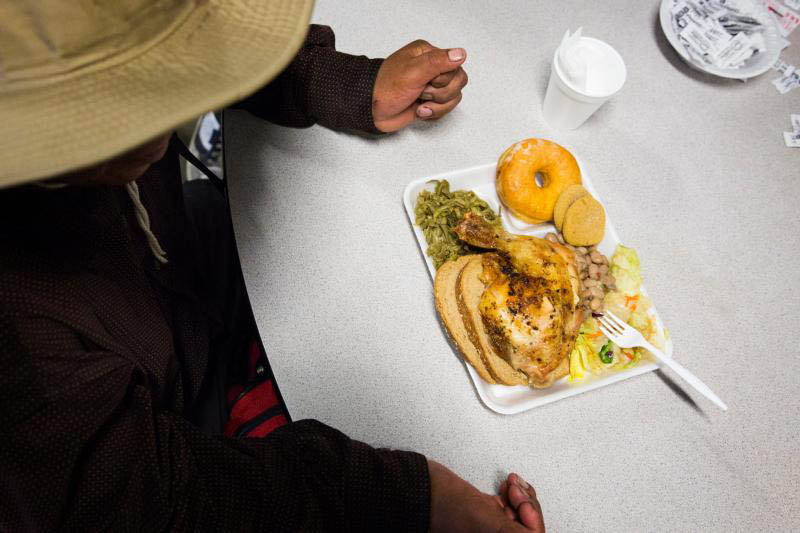
A man sits down to a meal at the St. Vincent de Paul Society dining room in Phoenix in this 2016 photo. Food connects us to our beliefs, our communities, our ancestors. (CNS photo/Nancy Wiechec)
Probably no one has expressed the place of food in life better than American writer and gastronome Mary Frances Kennedy Fisher: “First we eat, then we do everything else.”
From a spiritual point of view, Catholics might say, first the Eucharist, then everything else.
Food is first and foremost sustenance. We need it to nourish our body. But it is also ritual and heritage. Food connects us to our beliefs, our communities, our ancestors.
[hotblock]
From the important Jewish Passover to the fad of Taco Tuesday, humans have made food central to human celebration and socialization.
Christians are called to treat food like all of God’s gifts, with respect and gratitude, and to avoid overindulgence and waste. Yet temptations abound!
How many will admit they want to try each and every flavor of Kettle Brand potato chips? Yep, your hand is up. Who can resist the maple-bacon flavored ones?
Americans eat too much and not the right foods, according to the U.S. government office that tracks our nation’s overall health. We tend to pick processed packaged foods over fresh produce, meats and dairy.
The average daily calorie intake for Americans is around 3,770 — much higher than the recommended average of about 2,000 calories per day for women and 2,400 for men. More than half of Americans have preventable, diet-related chronic diseases.
Interestingly, while most of us consume more than enough food, 13 million U.S. children still live in households that don’t get the nutrition they need. Worldwide, 800 million people are chronically hungry.
[hotblock2]
Systems of production, distribution and consumption fall short when food is viewed from a global perspective. About one-third of all food produced for humans is lost or wasted, according the United Nations Food and Agriculture Organization.
“Whenever food is thrown out it is as if it were stolen from the table of poor, from the hungry,” Pope Francis has observed.
He called hunger and malnutrition in the world a scandal and has asked all people to reflect on the problem of wasted food and to identify ways to address it.
To kick start your hunger awareness and ways you can help, check in with Catholic Relief Services (www.crs.org) or your local chapter of the Society of St. Vincent de Paul. They are experts at what it takes to beat back hunger.
Although we must eat, we also must try to avert our gaze from the constant barrage of food messaging, advertisement and promotions. (Try avoiding the food samples on your next trip to the big-box warehouse. Not easy, is it?)
It’s good to remember that food is temporal and that satisfaction on earth means nothing in God’s greater plan for us.
“Do not work for food that perishes but for the food that endures for eternal life,” Christ tells us. “I am the bread of life; whoever comes to me will never hunger, and whoever believes in me will never thirst.” (Jn 6:27, 35)
While celebrating Mass in America’s agricultural heartland in 1979, St. John Paul II reminded all that hunger would persist even if everyone had their full.
[hotblock3]
“Farmers everywhere provide bread for all humanity, but it is Christ alone who is the bread of life. … Even if all the physical hunger of the world were satisfied, even if everyone who is hungry were fed by his or her own labor or by the generosity of others, the deepest hunger of man would still exist. … Therefore, I say: Come, all of you, to Christ. He is the bread of life. Come to Christ and you will never be hungry again.”
Catholics come to the eucharistic table to receive the body and blood of Christ; to be one with him and to be one with each other, his followers, the community of faithful. We are sent to go into the world and share that gift of Christ.
In all that is asked of us, we can squeeze in a few small practices to be more conscious of temporal and spiritual hunger.
We can pause after Communion to recall all who hunger and offer a prayer that they too might be filled with the grace of God through Christ Jesus.
Likewise, when feeling hunger pangs or simple cravings, let’s sit still for a moment, recall God’s gifts and be thankful for his Son and everlasting life.
That bag of chips can wait.
PREVIOUS: Telling non-Catholics why penance is necessary
NEXT: Food in Scripture: A sign of God’s love and steadfastness


Share this story